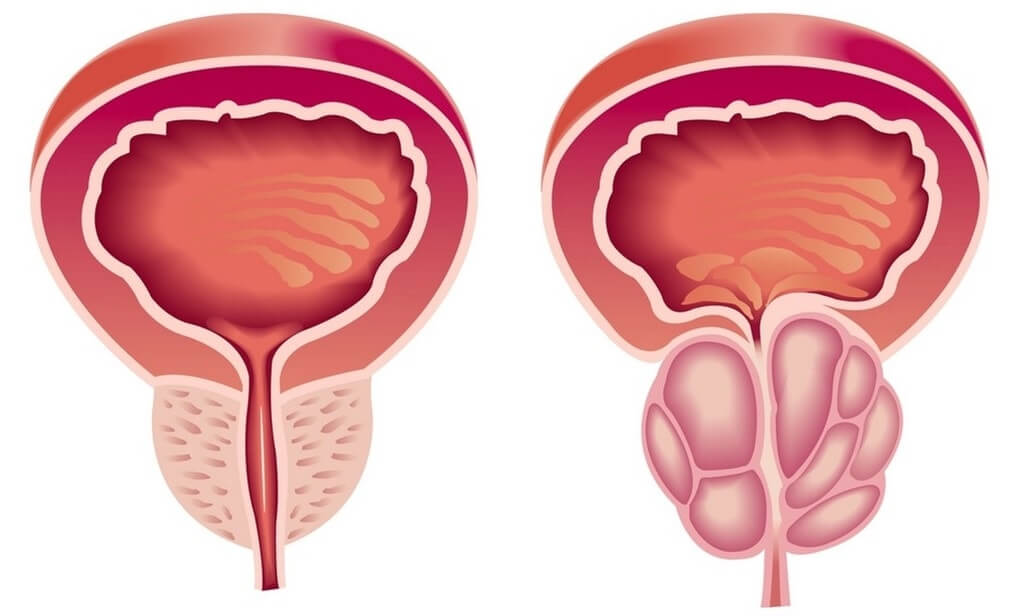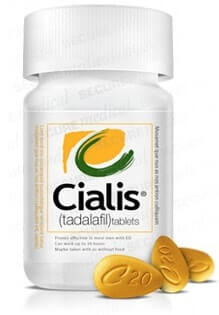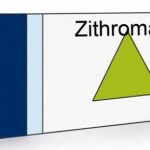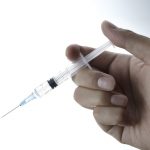Benign Prostatic Hyperplasia
BPH (benign prostatic hypertrophy, prostate adenoma, prostatic hypertrophy) is developed of glandular epithelium or prostatic stromal component. How does the etiology look like?
 Modern ideas of BPH development allow concluding about multi-factors of its pathogenesis:
Modern ideas of BPH development allow concluding about multi-factors of its pathogenesis:
- Turning of testosterone under the influence of 5a reductase enzyme into dihydrotestosterone causes proliferation of prostatic gland epithelium, i.e. glandular hyperplasia.
- Relative increase of estrogens level leads to proliferation of stromal cell, i.e. stromal hyperplasia.
- Reduction of 5a- androstenediol leads to increase of functional activity and quantity of a1-adrenergic receptors of prostatic gland, neck of the urinary bladder, prostatic section of urethra; to contraction of unstriated muscles of these organs which results in dynamic component development and occurrence of irritant symptoms of the disease.
What is BPH classification? According to size, the condition is divided into:
- Undervesical form (tumor grows towards rectum);
- Intravesical form (tumor grows towards urinary bladder);
- Retro-trigonous form which implies that tumor is located under triangle of urinary bladder. Thus, a so-called double block occurs: tumor slows down not only deflux of urine, but also passage of the latter through ureteric orifice.
Multifocal tumor growth is often observed.
Three stages of BPH clinical progression:
- The first stage of the disease (compensation) causes impaired urination with complete emptying of urinary bladder. Patients report weak urine stream, imperative urge occurrence (especially at night), a bit difficult urination, but there are no pathologic changes in kidneys and upper urinary tract at this stage.
- The second stage (subcompensation) is characterized by considerable impairment of urinary bladder function and occurrence of retained urine. Urine stream becomes thin and very weak, after urination a patient has the feeling of incomplete emptying, since part of urine remains in urinary bladder (100-00ml and more). Renal function gets impaired.
- The third stage of the disease (decompensation) results in absolute atony of urinary bladder, incontience with overflow is observed, upper urinary tract enlargement and progressive impairment of renal function is experienced.
Cialis (Tadalafil) Can Relieve BPH
 During clinical trial by Texan scientists, it was discovered that tadalafil (active substance of Cialis) is able to relieve symptoms of benign prostatic hyperplasia. This disease affects many men. Therefore, the results of given research have a huge practical importance. The point is that Cialis may become an alternative medication for elimination of BPH signs. Moreover, Cialis is more preferable than those medications which are available today, since peculiar characteristic feature of Cialis is its enhanced safety.
During clinical trial by Texan scientists, it was discovered that tadalafil (active substance of Cialis) is able to relieve symptoms of benign prostatic hyperplasia. This disease affects many men. Therefore, the results of given research have a huge practical importance. The point is that Cialis may become an alternative medication for elimination of BPH signs. Moreover, Cialis is more preferable than those medications which are available today, since peculiar characteristic feature of Cialis is its enhanced safety.
This research study was conducted with participation of more than a thousand of volunteers who were initially diagnosed to have benign prostatic hyperplasia. Men were citizens of ten different countries. All participants complained of difficult and detained urination, feeling of partial emptying of urinary bladder, frequent nocturia and other symptoms of hyperplasia.
As a part of the study, patients who took part in this experiment were divided into five groups. The first group took placebo once a day (i.e. substance without any therapeutic features). The rest four groups received tadalafil in doses of 2,5; 5; 10 and 20 mg during a week accordingly. Also, patients had to respond questions of a special questionnaire on particular weeks of the trial – 4th, 8th and 12th.
According to results obtained, medical experts state that daily administration of tadalafil in all afore-mentioned dosages lead to considerable improvement of BPH progression and disappearance of the majority of symptoms. Developers of this research were unanimous that the most optimal way of Cialis intake is its daily administration in the quantity of five milligrams.
It should be borne in mind that BPH is one of the most frequently met chronic disorders of male sexual sphere occurring at elderly age. In accordance with statistics, symptoms of benign prostatic hyperplasia are observed in 50% of men of 50 years of age and older. Administration of existing medicinal products which are designed for BPH therapy may be accompanied by such adverse effects, as arterial blood pressure decrease, vertigo, erectile dysfunction, as opposed to Cialis effect.
Medical specialists wan that men taking medicinal products containing nitrates (e.g. nitroglycerin) must not apply Cialis. For similar interaction may lead to dangerous decrease of arterial blood pressure. Also, tadalafil is by no means should be taken along with alpha adrenergic blockers. Thus, one should be responsible treating BPH with Cialis!
Horny Goat Weed as a Substitute of Cialis in Benign Prostatic Hyperplasia Therapy
This herb is a peculiar ancient plant which is also called Epimedium. It is mentioned in the works of Dioscorides and Pliny the Elder. The ancient Chinese scientist, Shen Nong, mentioned this herb in his ‘Medicinal Herbs Canon’ dated around 400s years A.D. Horny goat weed was also called Fairy Wings by Germans, Hollanders and other West Europeans due to its unique shape and small size of the flower. Englishmen called this plan a Bishop’s Hat because of the presence of spurs on its corolla. There is a legend about this amazing herb in Korea. People noticed that deer ate actively horny goat weed during mating dance. This fact made Korean healers pay much attention to this plant. As a result, it was discovered that Epimedium is able to restore and enhance sexual functions of organism.
Nowadays, it is well known and proven that horny goat weed is effective herbal hormone. It is one of the most efficient herbs having hundreds of years of experience and accepted by modern medicine. It is enrolled in official Korean Pharmacopoeia.
Horny goat weed contains a lot of peculiar substances. The aboveground portion contains flavonoids and their glycosides (icariin, quercetine, and others), steroidal saponins and alkaloids. Root and rootstock have alkaloids (magnoflorine, etc.), steroids, and aliphatic hydrocarbons (nonacosane, hentriacontane). The most important component of Epimedium is icariin.
Epimedium is a traditional plant raw material for medicine of Southeast Asia. Application of horny goat weed in the capacity of healing remedy has a thousand-year history. This herb is considered to be one of the most efficient plants for male and female libido boost. This plant has been applied as aphrodisiac (estrogenic and gonadotrophic) stimulating secretion of hormones and enhancing sexual desire for a long time. Experiments proved that Epimedium takes pronounced gonadosimulating action and has a testosterone effect: it stimulates nerve sensitivity and restores sexual arousal. Modern research studies have demonstrated that Epimedium stimulates increase of semen production, its motility and density. Horny goat weed vasodilates capillaries and helps to balance blood pressure. It improves blood circulation in those sections of blood channels which nourish pelvic organs. Everything that influences blood circulation makes impact on sexual function.
In Chinese and Korean medicine, drugs made of Epimedium are traditionally prescribe for enhancement of potency, infertility, loss of sexual sensitivity; as well as toning remedy for reproductive system; in case of erectile dysfunction, premature ejaculation and benign prostatic hyperplasia. Horny goat weed is also effective for improvement of semen production and capacity to release testosterone. Scientific explanation of Epimedium action lies in testosterone release which boosts sexual desire and endurance. Within the course of many centuries, men confirm that application of this miraculous plant improves their reproductive system.
Key therapeutic features of Epimedium:
- improves the work of male reproductive system, excites sensitivity, prevents from premature ejaculation, enhances potency;
- ameliorates functioning of female reproductive system, normalizes menstrual period, increases libido;
- improves renal function, work of prostatic gland, normalizes urination, blood pressure, and body fluid in organism;
- stabilizes immunity, rejuvenates organism, removes weariness, relieves stress;
- has antiviral and antimicrobial effect.



